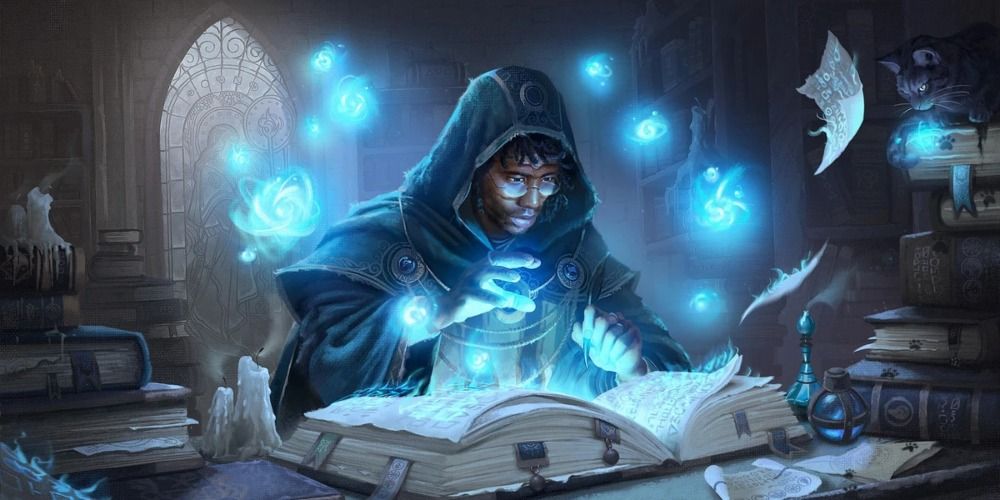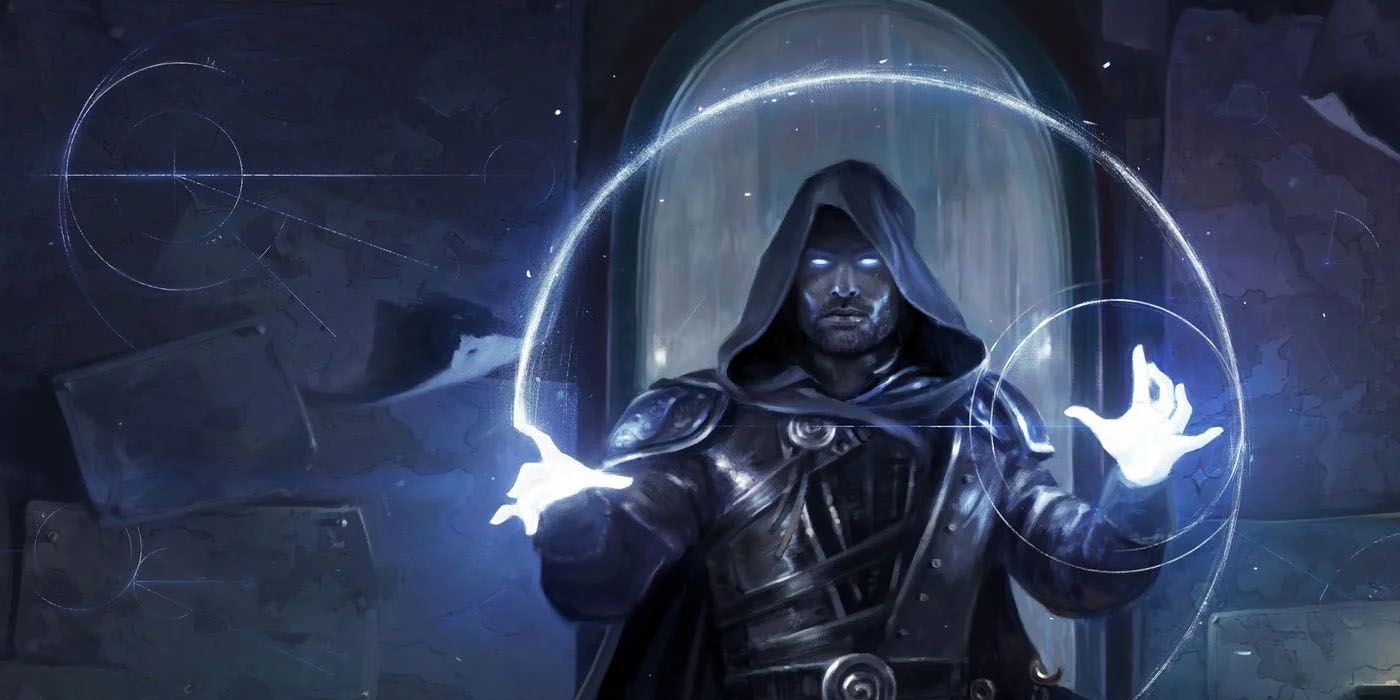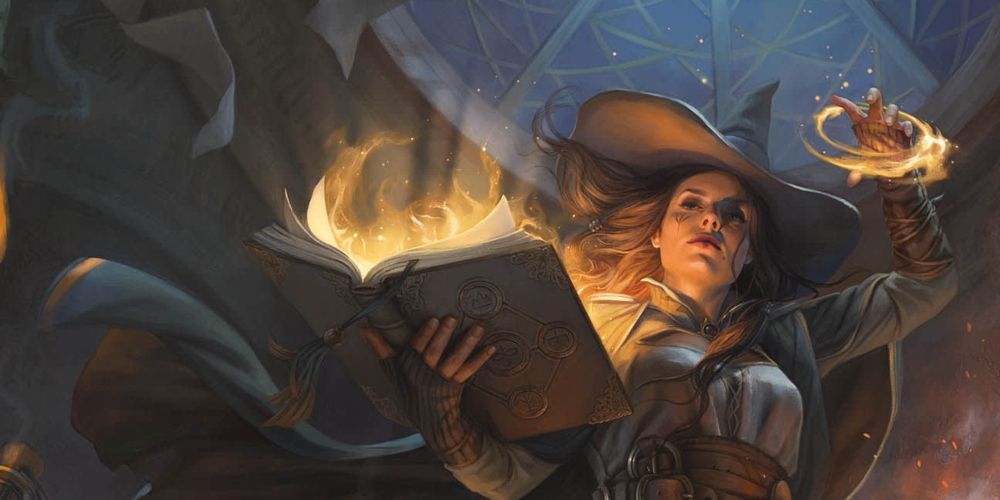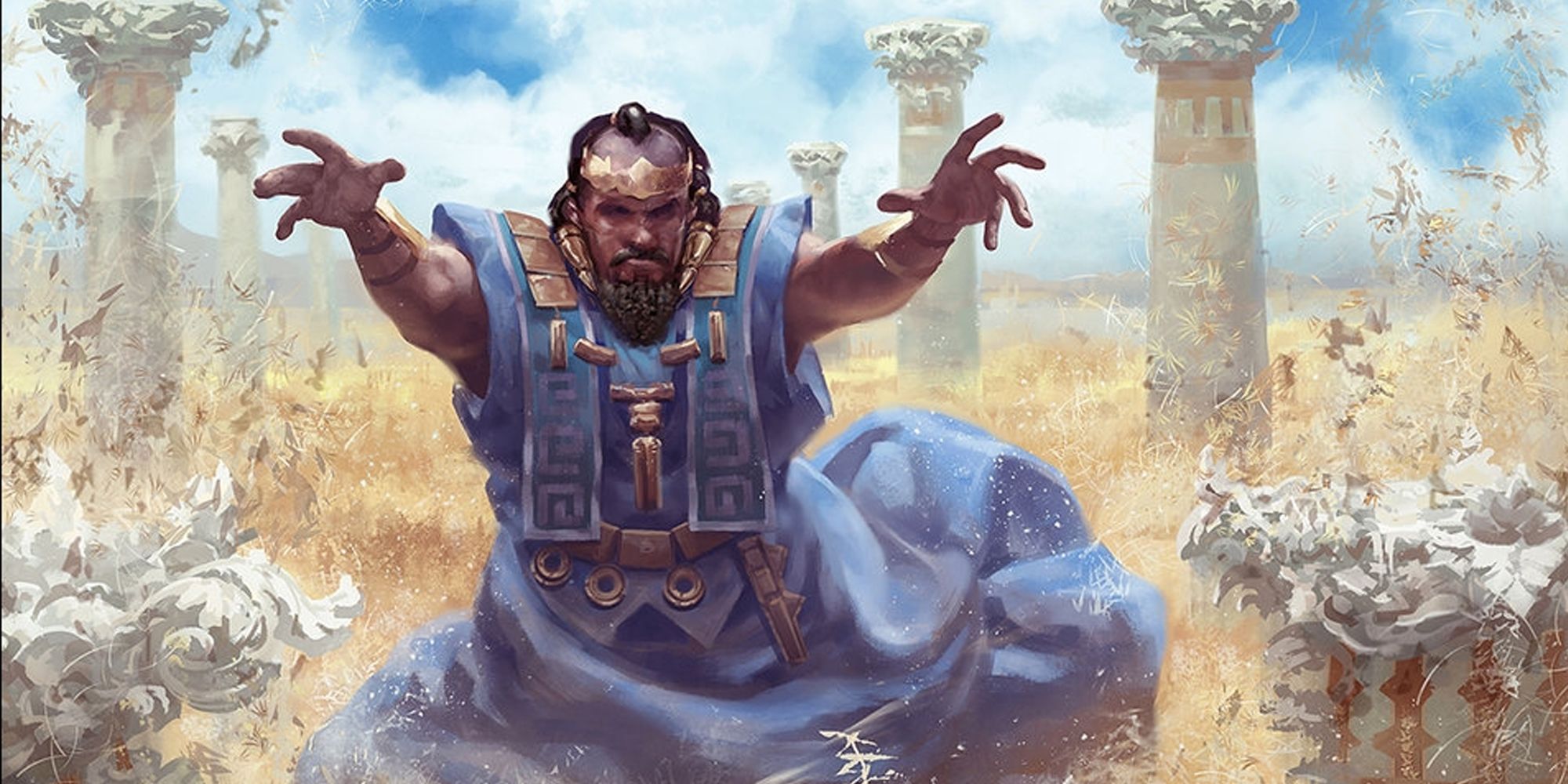Dungeons & Dragons Fifth Edition's wizards are magical generalists, able to learn and prepare more arcane spells than any class in the game. However, the most basic wizard subclasses give specializations within that generalist framework. School of Divination wizards in D&D 5e are experts in information in all its forms.
Divination spells in D&D 5e are rarely as hands-on as the other spell schools and require canny players to know when to use them. Nonetheless, the versatile and impressive capabilities of a D&D wizard can make for some very powerful builds, particularly with the School of Divination's unique features.
School Of Divination Wizard Build Summary
Ability Scores (In Order Of Importance) | Intelligence, Constitution, Dexterity, Wisdom, Charisma, Strength |
|---|---|
Race | Variant Human/Custom Lineage, Fairy, Mountain Dwarf |
Background | Sage, Investigator |
Feats | Telekinetic, Resilient: Constitution, War Caster |
Spells | Detect Magic, Magic Missile, Locate Creature, Fireball |
Multiclass | Artificer, Cleric |
Perks Of A Divination Wizard Build
Wizard Level | School of Divination Feature |
|---|---|
2 | Divination Savant, Portent |
6 | Expert Divination |
10 | The Third Eye |
14 | Greater Portent |
Divination wizards combine their spellcasting and subclass to bend the rules of D&D 5e. They acquire information, even beyond what the DM wants them to know, and manipulate foundational mechanics like dice rolls and spell slots. The subclass gives broad and valuable mechanics flavored as foresight and expertise. The School of Divination is the best D&D 5e wizard subclass for players who want to play the expert and go beyond the game's normal limits.
Divination Savant is the typical D&D 5e Player's Handbook wizard subclass feature that makes Divination spells quicker and cheaper to learn. Portent is one of the best wizard abilities in D&D 5e. It lets the wizard roll 2d20 at the start of each day and then replace up to two attack rolls, ability checks, or saving throws they perform or witness with one of those rolls. High rolls can bolster the wizard and their allies, while low rolls leave the enemy helpless.
Expert Divination recharges a lower-level spell slot every time the wizard spends one to cast a Divination spell. This makes a Divination wizard's signature spells much cheaper to cast than for any other character and gives them more effective spell slots than almost any other spellcaster in D&D 5e.
The Third Eye gives a School of Divination wizard in D&D 5e versatile vision-based powers. They can gain the ability to see into the Ethereal Plane, see invisibility out to ten feet, comprehend any text they read, or gain mundane Darkvision. The ability to change this on a long rest lets the player adjust their wizard to suit any situation.
Greater Portent makes Portent even better by adding a third roll into the equation. The School of Divination wizard gets another d20 roll to switch with any other roll during the adventuring day. This lets the ability be used a third time every day, as well as giving another chance for a particularly high or low roll to save for a vital moment.
Best Stats For A School Of Divination Wizard Build
Intelligence is any wizard's most important ability score in D&D 5e. Even with their valuable subclass features, Divination wizards live and die by their spellcasting. Higher Intelligence makes a wizard's spells more effective and lets them prepare more on a long rest. Consequently, School of Divination wizard builds in D&D 5e want their Intelligence as high as possible.
Constitution is also important for D&D 5e wizards. Wizards struggle with survivability at the best of times. Ideally, Divination wizards want to save their Portent dice for more valuable uses than avoiding single attacks. High Constitution helps a wizard stay alive when they find themselves in more danger than they want. It also aids with Concentration saving throws.
D&D 5e wizards also shouldn't neglect their Dexterity. With their lack of armor proficiencies, Dexterity is vital to bolstering a wizard's Armor Class. In addition, wizards benefit from going early in Initiative and using their most devastating spells to maximum effect. Nonetheless, a wizard's Armor Class will rarely be very high regardless of investment. Dexterity is less vital than other ability scores.
The Best Race & Background For A Divination Wizard
Variant human and custom lineage are two of the best options for any build in D&D 5e. The School of Divination wizard is no different. Many feats benefit wizard builds immensely. A free choice can be too much to pass up. This starts a D&D 5e Divination wizard off strong while saving later Ability Score Improvements to boost their stats.
Fairy is another option ideal for most wizard builds in D&D 5e. At-will flight without a spell slot cost or concentration is invaluable. This is especially true for fragile wizards with little in the way of combat features. Although the fairy's spellcasting doesn't involve Divination spells, it still boasts options any wizard can appreciate. In particular, most wizards can't get Faerie Fire.
Mountain Dwarf is a less conventional choice with significant benefits. Its automatic proficiency in light and medium armor solves a wizard's Armor Class issues immediately. On top of that, it's the only race option to give two +2 ability score bonuses. With Tasha's Cauldron of Everything's optional rules, these can go into any ability score.
Wizards should emphasize their high Intelligence with their D&D 5e background, with more general adventuring skills taking a back seat. Sage is an archetypal wizard background due to giving Arcana and History, making the character an academic expert. Investigator gives the Investigation skill to give a more active use for high Intelligence, while Perception is useful for any character.
Best 5e Feats For Divination Wizards
Wizard Level | Recommended Feat |
|---|---|
1 (Human/Custom Lineage Only) | Fey Touched/Resilient: Constitution |
4 | Telekinetic |
8 | Ability Score Increase: Intelligence |
12 | Resilient: Constitution |
16 | War Caster |
19 | Ability Score Increase: Constitution |
Fey Touched is one of D&D 5e's best feats due to its significant spellcasting boost. Divination wizards can use Misty Step to bypass obstacles outside combat or to escape sticky situations in a fight. It also provides a choice of first-level divination spells lacking from the wizard's spell list. Its +1 to Intelligence can boost the wizard's modifier or set up for their next feat.
Telekinetic gives a wizard something to do with their bonus action in combat. A ranged shove using their Intelligence can free them from close-up enemies, push foes closer to melee allies, or even knock them into environmental hazards. An invisible Mage Hand expands the wizard's versatility outside of combat. Wizards should aim for an odd Intelligence score so Telekinetic improves their modifier.
Resilient: Constitution helps protect one of a wizard's most precious resources: their spell slots. The wizard's best spells require Concentration, so a Divination build in D&D 5e wants as high a bonus to those saving throws as possible. Wizards should aim to increase their Constitution modifier with the bonus to gain more hit points from the feat.
War Caster only has one particularly potent benefit for a School of Divination wizard build in D&D 5e. Most Divination wizards avoid weaponry and melee combat and thus don't benefit from two of its features. However, advantage on Concentration saving throws is invaluable, especially with a high bonus. It also avoids the temptation to spend Portent on a saving throw in favor of more consequential rolls.
The Best Spells For A School Of Divination Wizard
The Divination Savant feature encourages a School of Divination wizard to take as many spells of their school as possible. Spells like Gift of Alacrity, Borrowed Knowledge, Mind Spike, Locate Object, Locate Creature, Arcane Eye, Scrying, and Foresight are useful to have moment-to-moment, while other spells like See Invisibility and Tongues are useful to prepare when needed.
However, D&D 5e's School of Divination shines in its ritual spells. Detect Magic, Comprehend Languages, and Identify are all valuable to have in a spellbook but not necessarily to prepare. The same is true of spells like Augury and Divination itself. This frees up preparation for more generalist spells.
Notably, the School of Divination is almost entirely free of combat spells. A D&D 5e wizard has to look elsewhere for that. Most builds benefit from fire-and-forget damage spells like Magic Missile, Scorching Ray, Fireball, Disintegrate, and more. In particular, they want at least one combat cantrip like Fire Bolt or Toll the Dead.
Many Divination spells don't require Concentration. A wizard build in D&D 5e should always look to run at least one Concentration spell due to their devastating effect. This can be a damage effect like Bigby's Hand, a buff like Haste, or a debuff like Hold Person. Wizards have enough spells to take various options and switch between them when needed.
Spell Level | Recommended Spells |
|---|---|
1 | Detect Magic, Magic Missile, Shield |
2 | Hold Person, Locate Object, Scorching Ray |
3 | Dispel Magic, Fireball, Haste |
4 | Arcane Eye, Dimension Door, Locate Creature |
5 | Bigby's Hand, Hold Monster, Scrying |
6 | Disintegrate, True Seeing |
7 | Finger of Death, Teleport |
8 | Dominate Monster |
9 | Foresight, Wish |
Multiclassing A 5e Divination Wizard
Artificer is an extremely beneficial multiclass for a School of Divination wizard in D&D 5e. A single level in artificer gives light armor, medium armor, and shields to increase a wizard's Armor Class significantly. It doesn't slow down spell slots and gives first-level spells the wizard can't otherwise access, like Cure Wounds. For many builds, this is worth being one level behind in new spells.
Cleric can be an unconventional and worthwhile multiclass build with Divination wizard in D&D 5e. One level in a cleric Domain like Life, Tempest, or War gives armor proficiencies all the way up to heavy. A wizard in plate mail is unconventional but incredibly well-protected with spells like Shield. There are also many healing, support, or utility spells that aren't overly hindered by a wizard's mediocre Wisdom.







